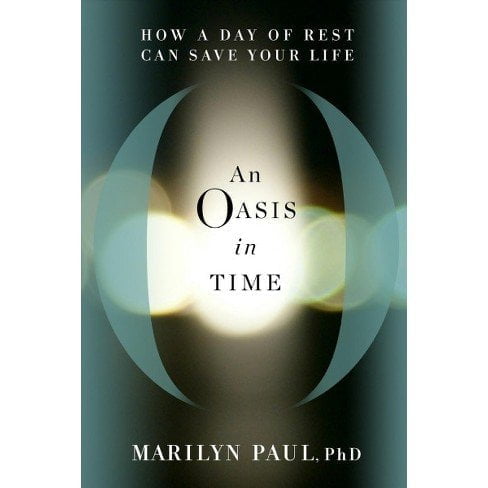The following is a conversation between Marilyn Paul, Author of An Oasis in Time, and Denver Frederick, Host of The Business of Giving on AM 970 The Answer in New York City.
https://omny.fm/shows/business-of-giving/marilyn-paul-author-of-an-oasis-in-time-how-a-day
Denver: An all too common problem in the nonprofit sector is burnout– too much to do with too few people, and even fewer resources. Couple that with an overwhelming sense of obligation of not letting down the people you serve, and you have the perfect formula for burnout. But as we all know, you won’t be able to take care of others unless you first take care of yourself. Here with us to discuss one very sensible way of doing that is Marilyn Paul, the author of a recent book entitled An Oasis in Time: How a Day of Rest Can Save the Rest of Your Life. Good evening Marilyn and welcome to The Business of Giving.
Marilyn: Thank you so much for having me, Denver.
Denver: The idea of a day of rest really goes back all the way to the seven days of creation and Genesis, and when on the seventh day, God rested. Give us some of the history of this day of rest through the course of civilization.

Marilyn Paul
Marilyn: It’s very interesting. You would think even in the beginning when life was slower, people would not need a day of rest. But in the Jewish faith, we started off with this idea of, God worked hard for six days of creation and then rested for the seventh day. We are commanded; it’s the fourth commandment, to take a day of rest every week. Sabbath means stop. So, actually it means stop, and do something different. Have a day that’s distinct from the other days of the week. Then later of course, in the Christian faith, they adopted the Sabbath, but they shifted it to Sunday to make a distinction from Judaism. In the Muslim tradition, there is Friday which is the day of congregation and congeniality and being together for prayer.
Denver: When did this day of rest, Marilyn, disappear in so much of American society?
Marilyn: When I was growing up, it was still there. We had Sundays which were relatively quiet. But over the 50s and 60s, there were a number of legal challenges to the idea of closing businesses for a day a week. What we have now is what we’re all familiar with: a seven-day cycle where there’s not a distinctive day of quiet on any one day of the week.
Denver: I don’t think that many people would argue with the concept of taking a day of rest. It really makes perfect sense to me and to so many others. But then you have first to decide to do it and then actually do it… which as we know, those are two entirely different things.
First, if you are encouraging someone to take a day of rest, what would be the case that you would make to them?
Marilyn: That is the place to start; it’s to start by making your own case. Like, what for example might you be missing in your life because you don’t have this distinctive day? What a Sabbath, or I call it, “an oasis in time,” does for your week is it adds a rhythm into your week. So, you have a lot of energy in startup, go-to-it-iveness in the beginning of the week, and then towards the end, you wrap things up, and then you do something that’s renewing or restorative.
I worked with someone once who, for example, he loved Balzac. In his 20s in college, he flipped over the work of Balzac. When he was 40, he decided to buy the collected works, and when I met him in his mid-60s, he still had not opened the books. So, there are these things in our lives that we love that we don’t get to. And there are people in our lives whom we love dearly, but don’t quite have the time to sit comfortably with. Or, there’s something we love to do. For example, I know a potter who’s just too busy to make pots. So, for all of us, we have those things, those people, those places that we may get to, but we touch them in a rush. And the whole idea of a day of the week– which I have to say often people tell me that’s absurd– but let’s just keep with this idea of a day because it is possible. If I can do it, anyone can do it. I am as overworked and overwhelmed as the rest of us.
Denver: Have you found yourself to become more productive since you started taking a day of rest?
Marilyn: It’s beyond belief to me how much more productive I am; that I have learned. And it’s a learning; it’s a practice. I had to learn how to stop, and I have a workaholic type of personality, so this was not easy. For example, last year we reconstructed a home; I home schooled my son; I wrote the book; I launched the book, and I hosted our son’s bar mitzvah. That was just the beginning. But I was able to do everything, and people would say: how do you do it? And I say, I do it because I take a day off every week, and they go sort of, Huh? But the key is: renewing your outlook, renewing your energy, renewing your connections; it’s like a super power. You get recharged in ways that you simply cannot if you keep trying to get a little bit more done.

Denver: It’s a little counterintuitive I know. It reminds me of an example from marathoning. There was a guy by the name of Jeff Galloway, and he had promoted this concept of walking one minute every mile. It was almost impossible for marathoners who are trying to get the best time to do that. But when they did it, they realized their times went down, and the reason was is they were able to rest the muscles they use for the rest of race during that one minute and were much stronger at the end. So, sometimes these things which seem to make no sense whatsoever actually end with a better result.
Okay, I’ve decided to do it. What advice would you have for me in actually doing it and sticking with it? I can imagine this must be very difficult at first.
Marilyn: I think it is. One thing you’ve got your case. You know why. What’s next? The first thing I tell people is to plan. Don’t just say, “Okay, I’m sold. Let’s get started.” Plan for your time. It could be an hour. For example, start with an hour. A good hour to start with is the first hour of a weekend morning. But plan for it and protect it. Really say, even if I get anxious; people do get anxious when they stop trying to get things done. So, plan for it, protect it, and prepare a little something. Pull out your Balzac or your potting, or your kittens or whatever it is; that you’re just going to sit with and enjoy that for that hour.
I say, start small, but make a commitment of four weeks in a row, so you get the hang of it. Secondly, I say have a beginning and an end. Don’t sort of begin and sort of end. Start with, okay, I’m waking up. It’s my oasis in time now. Or, do it at the end of the day or the middle… whatever works for you, and then end it. Say, I’ve had my hour. Now, I’m back into the swing of things. The reason to designate this is, otherwise, it never really happens.
The third thing I say to people is: disconnect. Do not think that scrolling through Twitter or Facebook is an oasis in time. You have to really disconnect and turn your attention to something different.
Denver: This just gets harder and harder. That is great advice. Finally, Marilyn, are there any unexpected benefits to taking this day of rest that might pleasantly surprise us?
Marilyn: I would say that one of the things… I’ve talked to scores of people who do this, and one thing they say, even someone I spoke to just started about a month ago, is: one, they won’t give it up. Once they get started, they say their creativity, their authenticity, their sense of connectedness to their real, rich lives is so powerful. And when you’re in the nonprofit world, you really do need those moments of savoring your life to regain your sense of meaningfulness.
Denver: Great advice, Marilyn. I hope many of our listeners, including myself, give it a try.
The book again is An Oasis In Time: How a Day of Rest Can Save the Rest of Your Life by Marilyn Paul. Do you have a website, Marilyn?
Marilyn: Yes, I do. It’s marilynpaul.com, and if your listeners go to it, they can download A Quick Start For a Slow Time. It’s the advice that you want to just try it out and get started.
Denver: Great. Thanks so much Marilyn. It was a real pleasure to have you on the program.
Marilyn: Thank you so much. Great to be with you.
Denver: I’ll be back with more right after this.

